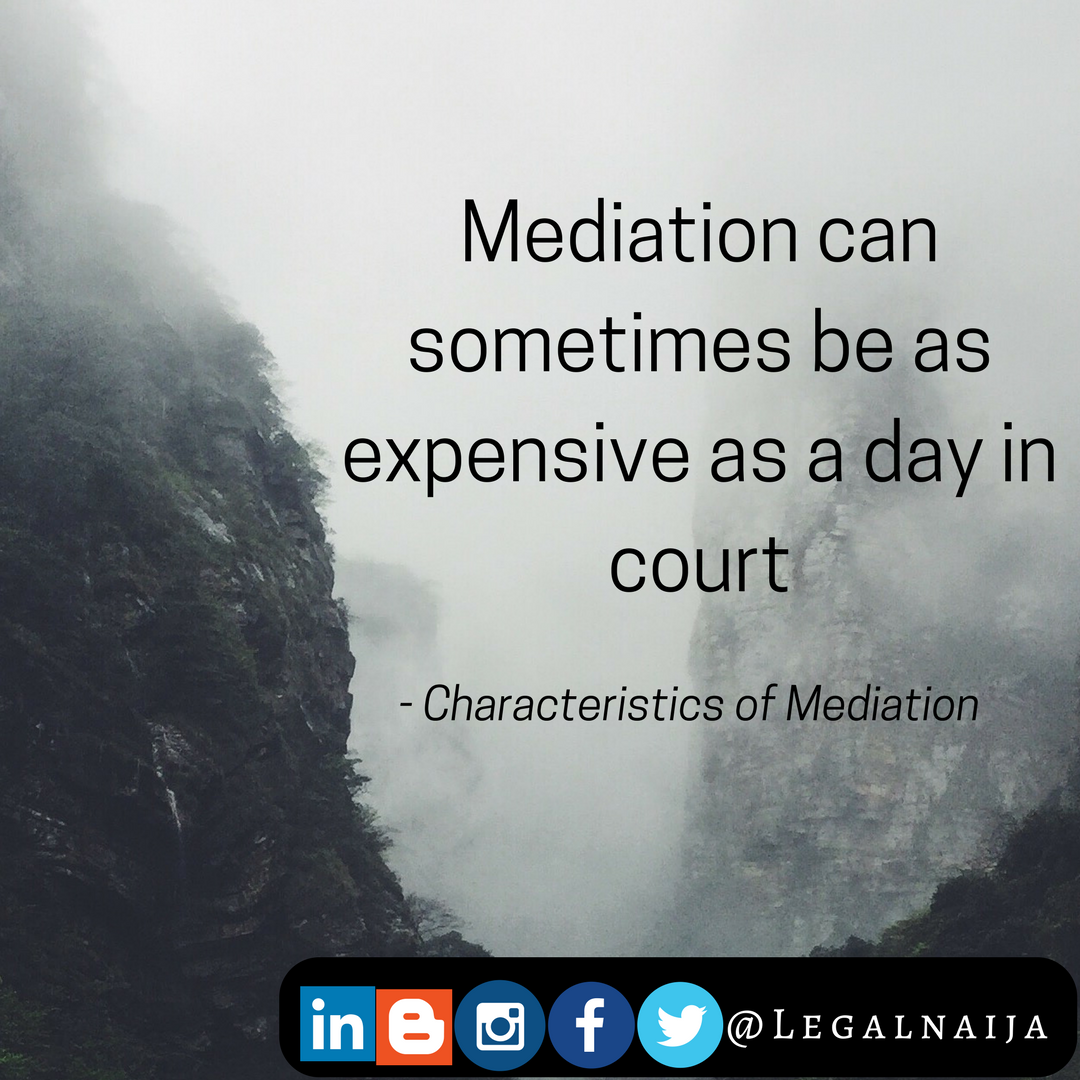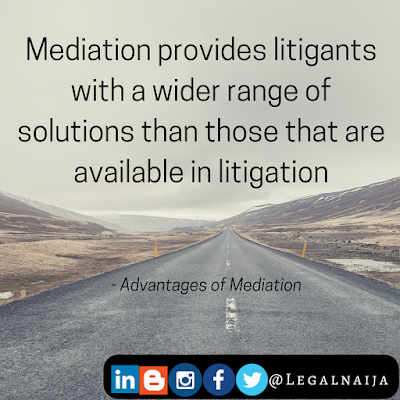Arbitration as a better alternative to litigation: An
exposè on the procedural stages
ABSTRACT
Alternative Dispute Resolution (“ADR”) simply refers to any means of
dispute resolution excluding litigation in a courtroom. It is a form of
facilitated settlement, which is confidential and without prejudice.
Consequently, the details of the process are not usually disclosed to the
public except where it snowballs into a court action.
The laws governing arbitration in
Nigeria include the Arbitration and Conciliation Act (“the Act”),
which is a federal law, Lagos State Arbitration Law 2009 (“the Lagos Law”) and
some other states’ arbitration laws. This paper seeks to examinethe procedural stages in arbitration,one of
the most common ADR mechanisms, and the reasons which
make arbitration a better alternative to litigation.
I INTRODUCTION
Arbitration
provides a forum for participants to present arguments and evidence in support
of their case, to a third party neutral who makes a binding decision called an
award. It is a process controlled by a single arbitrator or a panel of
arbitrators appointed by the parties.
Any
of the parties to a contract may adopt arbitration where an arbitration clause
is contained in the agreement, and a dispute arises in relation to it.Where
there is noarbitration clause and the parties desire is to proceed to
arbitration, a consent to arbitration via submission agreement may be entered
by the parties.
The
expeditious disposal of cases in arbitration stems from the less formal
procedure adopted in arbitral proceedings.The procedure for initiating and
conducting arbitration are spelt out in the arbitration rules to be found in
the First Schedule to the Act.
One
of the advantages of arbitration is that the disputants have consensually
chosen their own private “judge” called the arbitrator(s).
The arbitral tribunal determines the venue of the hearings after due
consultation with the parties. Where there are three or more arbitrators,
decision is by majority. Therefore, an odd number of arbitrators is advised.
Arbitration
commences with a notice to commence arbitration being sent by an aggrieved
party to the other party.In the course of arbitration proceedings, request for
more information, discovery of documents and visits to relevant location may be
done. However, to ensure expeditious disposal of the matter, all of these
issues would most likely be narrowed down during pre-hearing review.
The
tribunal listens to the oral statements and questioning of the witnesses of
both parties(cross examination)as examination-in-chief may be in form of
witness statements on oath. Also, expert witnesses may be called by the parties
to render their opinions on issues in dispute.This may be pruned down during
pre-hearing review as the parties are likely to distill witness of facts and
expert witnesses.
Arbitration
proceedings are not however regulated by formal rules of evidence as stipulated
in the Evidence Act thereby resulting in less formal and flexible proceedings.
II PROCEDURE
IN ARBITRATION
In
ensuring an expeditious process in arbitration, some basic procedures are adopted
which endears the business world to arbitration instead of litigation:
JURISDICTION
The
first step in any arbitral proceedings is to constitute the arbitral panel.This
can either be provided in the arbitration agreement or conducted in accordance
with the Act. In any
case, there can be no arbitration without an arbitrator and an arbitrator must
be appointed to conduct the reference. Once the arbitrator is appointed he must
be clothed with jurisdiction.Jurisdiction is the authority to arbitrate
upon the dispute between the parties.
The arbitrator is only authorised to
exercise the jurisdiction and powers conferred on him by the parties.His
jurisdiction is derived from the agreement of the parties i.e. the issues
submitted to him for determination or from Statute. The arbitral tribunal is
competent to rule on its jurisdiction.
PRELIMINARY MEETINGS
The
mainpurpose of a preliminary meeting is to plan the expeditious and efficient
conduct of the arbitration. Arbitration is a broad spectrum where innovations
and variety are not only encouraged but lauded:
“…the
arbitral tribunal may, subject to this Act, conduct the arbitral proceeding in
such a manner as it considers appropriate so as to ensure a fair hearing”.
The
overriding procedural obligations of an arbitration tribunal in conducting a
reference include:
(i) complying with the express mandate, if any,
laid down by the parties;
(ii) conducting the process fairly and even-handedly;
and
(iii) using all reasonable dispatch in entering on, proceeding
with the reference and making an award.
Preliminary
meeting therefore cannot be held until:
(i) The tribunal has been appointed;
(ii) The tribunal has been provided with the
information as to the principal issues between the parties although this can
sometimes be dealt with at the preliminary meeting;
(iii) Administrative fees, where applicable, have
been paid; and
(iv) The impartiality of the arbitrators have been
checked, where necessary, and the result made available to all.
It
is imperative that adequate preparations be made well ahead by the arbitrators,
the parties and their advisers before the preliminary meeting. Issues like the (i)
venue,
(ii) time,
(iii) transportation arrangements for the arbitrators and other sundry issues must
be addressed in order to have a successful meeting and most importantly, a well-drawn
up agenda.
In
advance of the preliminary meeting, the parties should also try to identify the
matters to be dealt with and, if possible, agree on the procedure and any
directions to be sought from the tribunal. If agreement is reached, this will
save time and costs at the preliminary meeting itself and may even render such
meeting unnecessary.
PRE-HEARING REVIEW
It
is preferable except in very simple cases to hold a pre-hearing review before
the hearing and after all the preliminary meetings. This helps to save time and
costs at the hearing because the pre-hearing review helps the arbitrator and
the parties clarify all outstanding issues so that by the time they go into the
hearing they can go through them on a day-to-day basis and finish in a short time.
The matters to be discussed at the pre-hearing review will vary depending on
what has transpired at the preliminary meetings (if any).
PROCEEDINGS AT TRIAL
The choice of proceedings to be adopted depends on
the facts of each case. Where parties do not
choose or agree on any type of hearing, the tribunal chooses the type of
hearing.It is better for the parties to agree
on the type of hearing to be adopted where there is a serious dispute over
relevant facts. The proceedingat trial may take the form of:documents only where there are no oral testimonies to support
the claim;documents only with brief oral final submissions; or documents only
with only experts in attendance to give oral testimony before the arbitrators.If
“Documents Only” method is
agreed, then the “issues” need
to be framed with more precision than when any other form of proceedings is
adopted.
Short
Procedure Hearing:
This
is only suitable for “quality”
dispute requiring some summary decision,i.e,“look
and sniff” cases. Each party usually
bears his own costs.
Full
Procedure with Hearing:
This
is for disputes that require examination
or cross-examination of witnesses of fact. This evidence is usually partly oral and partly documentary.
The tribunal must consider whether a Scott Schedule
is desirable.
It must
be noted that the procedure adopted determines the length of the hearing.
However,the
procedure adopted must not contravene the provisions of the applicable law and
procedural rules:
“…the Claimant to state the fact
supporting his Points of Claim, the points at issue and the relief or remedy
sought by him whilst the respondent is to state his Points of Defence in
respect of the particulars unless the parties have otherwise agreed on the
“required elements of the Points of Claim and Defence.”
The
tribunal and parties must consider such factors as the complexity of the matter
and the nature of the dispute in ensuring that they adopt the most suitable
procedure. Disputes with little factual details may be best suited to the
Statement of Case procedure by mere exchange of correspondence; e.g. quality
disputes which are tobe determined on expert evidence only while pleadings may
be best suited to cases involving complex issues of law.
The
tribunal is to determine the time for exchange of written statements. In any
case, the law provides that the time must not exceed 45days except if
justifiable.
AGREED BUNDLE
In
arbitration proceedings the parties agree on an “Agreed Bundle” of documents,
which constitutes the documents to be referred to during the hearing. The arbitrator
will direct the parties to meet and agree on the bundle within a specified
time. This also helps to fast track proceedings.
RELEVANCY AND ADMISSIBILITY
The Evidence Act excludes
arbitration from its application.
This is not to say however that rules of evidence do not apply to arbitration.
In fact, the rules of evidence are wider than what the Evidence Act provides
and they apply to arbitration to enable the arbitrator come to a reasonable
decision on the evidence before him. It should be noted that Section 15 (3) of
the Actconfers powers on the arbitral tribunal to determine the admissibility,
relevance, materiality and weight of evidence placed before it.
The reason for this provision is to play down as much as possible the recurrent
technicalities that surround the rule of relevancy and admissibility under the
Evidence Act.
III ARBITRATION
AS A BETTER ALTERNATIVE
The
numerous advantages of arbitration over litigation include a faster and cheaper
means of dispute resolution, utmost privacy of the issues between the partiesamongst
others. While litigation has been shown to give room for frivolous techniques, arbitral
proceedings have been sped up byadmitting written statements in place of
opening and closing speeches, admitting depositions made by
witnesses of fact and inviting such witnesses only for cross-examination. In
addition,admitting reports prepared by experts while they appear only for
cross-examination,using a Scotts Schedule.
Other ways to save time at the
hearing are:
Defining the Issues
The
arbitrator should direct, at the outset, that a list of issues be agreed and
delivered to the arbitrator a reasonable time before the hearing, and that
failing such agreement each side delivers a list of what it considers to be the
issues. The procedure for defining the issues vary according to the nature and
complexity of the dispute.
Exchanging
Proofs in advance
The
arbitrator may require that proofs of all witnesses be exchanged, and copies
delivered to the arbitrator, before the hearing.
Documents
Selected before Hearing
The arbitrator
may require that the documents to be referred to at the hearing be selectedbefore
the hearing, and this should be the responsibility of the advocate who is to
conduct the case. The arbitrator should also
direct that:
(i) The consolidated bundle(s)
of the documents selected should be delivered to the arbitrator by a specified
date before the hearing;
(ii) At the hearing all the
documents so submitted shall be taken as read (because he will in fact have
read them); and
(iii) At an appropriate stage
the arbitrator will specifically consider the question whether a substantial
number of irrelevant documents has been selected, and if so whether a special
order should be made in respect of the additional costs thereby occasioned.
The
frontloading system and the case management conference in the rules of court
can be likened to the preliminary meetings, pre-hearing sessions, defining
issues and exchanging proofs and written statements obtainable in arbitration
proceedings. The introduction of these similar concepts in the rules of court
and a fast track division is to ensure efficient and speedy dispensation of
justice but the bureaucracy in the system has prevented the system from making
any remarkable achievements. Even the motion for summary judgment in the rules
which shouldn’t take more than 2weeks to hear and determine usually suffers the
same fate as the cases on the general cause list.
It
is the duty of the arbitral tribunal to adopt
procedures suitable to the circumstances and to avoid unnecessary delay and
expenses. The parties must also cooperate by doing all things necessary
for the proper and expeditious conduct of the proceedings as cost may be
awarded against any party that foists any sort of delay tactics in the course
of the proceedings.
IV CONCLUSION
The
proceduresin arbitration sessions examined above have proved effective and
efficient in the expeditious disposal of arbitral cases, thereby endearing the business
community and the public in general to the choice of arbitration over
litigation. The adoption of arbitration either by an arbitration clause or
submission agreement has become more popular as people are coming to terms with
the fact that arbitration constitutes a better alternative. It is also an
amicable method of dispute resolution enabling the parties to maintain their
business relationships.
This is laid down in the popular case ofCOMPETENZ v COMPETENZ. See also section
12 of theAct and Article 21 of the Arbitration Rules in the First Schedule to
the Act.
In arbitration sessions, parties
bring numerous claims and issues which make the arbitral proceedings appear
like litigation. In order to avoid this, the tribunal may resort to the use of
the Scott schedule. The Scott schedule is essentially a table with inputs from
both the claimant and respondent. The claimant sets out hisargument first, and
then the schedule is passed to the respondent to set out his responses. The
main objective of the Scott schedule is for the issues in disputes to be
presented as clearly as possible, thus saving time, reducing cost and
conserving efforts.
Photo Credit – www.newtonarbitration.com






